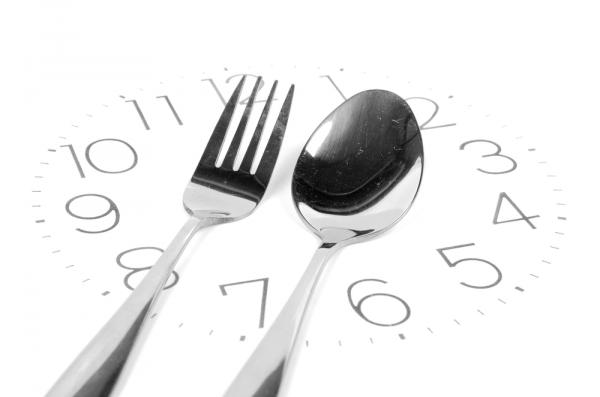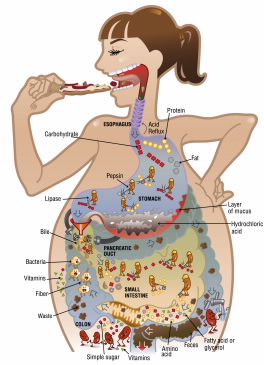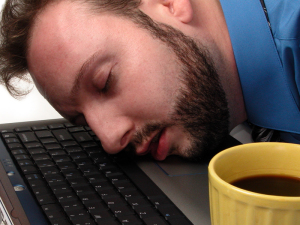
Breaking The Rules: FASTING
April 14, 2013 // Nutrition, Wellness
We know food is the fuel source for the body. We know food influences the body’s metabolism. We know a fast metabolism yields fat loss. What we thought was that eating small amounts of food often keeps the metabolism at the highest production. We may be wrong. Intermittent Fasting has become the newest topic of interest amongst health enthusiasts. New research and studies have shown that adjusting the time between feedings can significantly intensify fat loss through an increased metabolism, along with many other health benefits. Let’s discuss why this topic is gaining the attention of many health professionals and how it may benefit the general public.
Why We Should Eat Often
I always tell people success starts with consistency. A great way to learn how to eat better is learning to eat often. Eating often is a great tool to learn portion control and food selection. When we are hungry, thoughts of nutrition and health subside while urges to binge on sweet and savory foods overwhelm us. If we can reduce the hunger sensations (initially), we make better choices for our next meal or snack.
Better selections have better outcomes for our health. Think of it like investing. Nutritious foods will make all the difference down the line but initially they have little effect on our energy and hunger levels. Nutritious foods are like a 401k. You know it’s good for you and you try to use it but it doesn’t help you immediately. We are focused on satisfying the moment. That’s why we love junk foods. Junk foods (sugar, flour, syrups, sweets, candies, etc.) will quickly absorb and dramatically, yet temporarily, increase your energy levels. Junk foods are like the cash in your wallet. If you spend all your cash and never save, you will never get ahead and must work forever. If you eat junk foods regularly, you are always at the mercy of the sudden energy dips along with the plethora of health issues, including weight gain and obesity. It’s always better to invest initially (eat healthy, nutritious foods) and spend a little cash here and there (eat sweets).
So, I highly recommend people eat every 3-4 hours, even it’s a handful of nuts or a piece of fruit. Keeping yourself satisfied will yield better selections for each meal. The goal is to avoid hunger-drive decision making.
But…
-
Could learning to feel hungry be a good thing?
-
What happens if we throw in a huge break between meals?
-
Will hunger just increase until the point of something catastrophic?
First, let’s review what happens when we eat food.
The Eating Process
When we eat, food travels from the mouth to the stomach where it is broken down as it enters the the small intestines. Food is pushed through the small intestines where the nutrients are absorbed and the by-products are continued through the large intestines until they exit the body. This process takes 24-72 hours. This means that food you ate yesterday is still in your body. You are plenty full, even if you don’t feel “full”.
Also, let’s review digestion and absorption.
What Happens On The Inside
This could easily spin off into a separate discussion. Digestion and absorption are some of the most fascinating topics of health. After years of learning what happens to food once it enters our bodies, I have a much better understanding of the importance of nutrient selection and timing. Most people do not realize the differences of eating at various times in the day and how to make proper food selection based on these factors. This greatly affects the reaction to foods (growth, repair, storage, etc.)
When we eat food, energy is required to break down the food into nutrients and move the nutrients around the body. Our energy is not infinite and so our bodies must switch its focus from whatever tasks its handling at the moment to processing the newly acquired food that just entered. Less overall available energy means the body transforms into a state of sleepiness, satiety, relaxation, and rest. Consider the term “food coma” and you can see why that phenomenon occurs. You can also understand that even on a smaller scale, your body is focused on the food processing correctly and efficiently rather than whatever you are doing externally. When we eat, we should assume things are going to slow down.
It gets worse…
So your body wants to digest and absorb this food. It wants a stress-free environment with little to no activity so it can utilize all energy and resources on completing its tasks properly.
You want to keep up your energy and focus. You need a fast-paced, highly-intensive state of movement and activity to be productive. Stress, focus, and energy are required for this to work.
Do you see the tug-of-war going on?
It’s mid-afternoon at work and you’re getting tired. You need to stay awake and focus but your body is just not responding as you’d like. You resort to either another dose of sugar-filled coffee or a red bull or some sweets because that’s quick energy. The cycle of irregular energy levels continues.
I always use animals as a way to understand the natural drive of exercise, hunger, feeding, and sleep.
An animal hunts because intuitively it has a drive to eat, nourish, and replenish its body. It hunts under a state of dire need for food, which means all its energy is spent on hunting successfully. It’s energy levels are skyrocketed because digestion has subsided (it has no food inside). So, the hunt happens and food is caught and eaten. Soon after eating, animals rest and sleep to allow the newly acquired food to digest and absorb.
- The hunger drive supports high energy production.
- The hunger drive leads to successful hunting.
- Once food is eaten, sleep follows to digest and absorb.
- The cycle repeats when necessary.
What do we [humans] typically do?
- Eat often.
- Eat before exercise.
- Eat and continue working.
- Avoid eating before we sleep.
Hmmm….
Eating often is highly effective as a tool to learn how to make healthier eating decisions. But it seems to go against the nature of replenishment for the body.
Eat, Sleep, Wait
If we step outside of the traditional eating patterns of Americans and explore other options, we see intermittent fasting as a subtle but natural occurrence that our bodies endure. Think about the first meal of the day — breakfast. Break the fast. Fasting happens everyday (well, every night) with every person. Typically, most people fast anywhere from 6-10 hours every night. Breakfast is the first meal after the fast from the previous meal, which is usually dinner the evening prior. Now let’s consider switching the traditional meal times and seeing how the fast applies.
Imagine eating right before bed — let’s say 11pm. Yes, eating a full meal. Now go to sleep for the night and when you wake up, avoid eating until 9am.
You would think you’d be ravishingly hungry, wildly delirious, and completely out of sync. I bet you the opposite. In fact, I bet you would feel better than usual with a high amount of energy and a feeling of lightness. It wouldn’t surprise me if you’d forget to eat unless reminded.
I say this with confidence because previously I assumed fasting would be ineffective and unhealthy for the body. This all changed when I start studying advanced nutrition and began to understand the complications of digestion and absorption. I also have been testing intermittent fasting on my own body for the last month and I am astonished with all the positive changes I’ve experienced. Here’s the most notable ones:
-
A noticeable reduction in body fat
-
A dramatic increase in focus and alertness throughout the day
-
Better sleep
-
Better compliance to eating healthy foods
I don’t want to get off topic and talk about my experiences just yet with my Intermittent Fasting, as I am still testing and recording changes. I’m simply writing this article to get you to understand what happens when we eat food and how our typical habits may combat the natural patterns of energy production. I will continue to write about Intermittent Fasting in the future.
More Information
If you have 10 minutes available, watch this short presentation by Dr. John Berardi. He is one of educators and arguably one of the most knowledgeable nutritionists in the industry. This presentation was held in the UK at health summit and it’s about Dr. Berardi’s experiences with intermittent fasting. He also discusses the background on IF, the future of IF, and how intermittent fasting can drastically reduce or eliminate jet lag. Dr. Berardi went as far as two days without food (ironically he is giving the presentation while still in the fast)! . There are a bunch of short videos and they are very interesting and informative. Here’s the link:
http://www.precisionnutrition.com/intermittent-fasting-video-1
*A Note of Caution*
Intermittent Fasting is certainly not for everyone. In fact, I don’t recommend it for most people. IF requires an individual to be disciplined, structured, and educated. It’s very easy to splurge on foods once breaking a fast. The goals of health strategies is to increase one’s health status. There are other ways besides IF that can be utilized to help achieve an effective, manageable eating lifestyle.
I still recommend that people eat something small every 3-4 hours. Eating small, frequent meals is great for most people because there is never any hunger sensations, which means someone is satisfied through the day without having to overindulge. Managing portion control is one of the most important tasks for a responsible eating lifestyle.
IF is still in its very early stages of being researched and studied. Creating a large period of time without food has plenty of risks for various individuals. IF can be dangerous for someone with health risks such as low blood pressure, diabetes, eating disorders, or celiac disease. You should consult with a nutrition professional or your doctor before attempting to introduce any extreme fasting strategies into your eating lifestyle.
Also, intermittent fasting is a break between meals. It is not a break in hydration. Hydration is the most important task for a person. Drinks that are combinations of chemicals, syrups, and additives are not ideal for hydration and are known to cause major health issues. One of the most important ways to maintain energy is through proper hydration. Drink water often.




